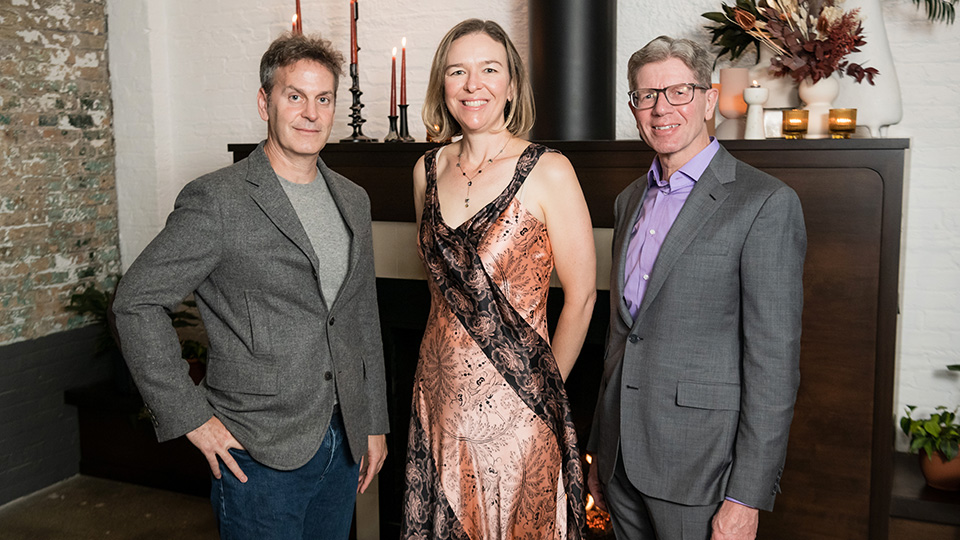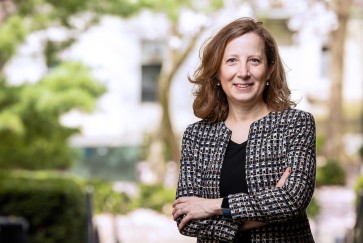Northwestern has announced the inaugural winners of the Kabiller Science of Empathy Prize, which recognizes a Kellogg School faculty member who has led novel research advancing our understanding of empathy and trust, and honors a Kellogg alumnus known for leading with exceptional empathy.
The prize is made possible by the generosity of David G. Kabiller (’85, ’87 MBA), co-founder and head of business development at global investment management firm AQR Capital Management. For decades, Kellogg has sought to develop empathy-exemplifying leaders and conduct research on empathy in fields ranging from management to finance to economics. The prize was created to celebrate Kellogg’s strengths in and rigorous approach to empathy, and stimulate new research in this area.
This year’s faculty prize recipient is Nicole Stephens, Jeanne Brett Chair and Professor of Management and Organizations at Kellogg, and professor of psychology in the Weinberg College of Arts and Sciences, for her research on how misunderstanding across “cultural divides” contributes to systematic inequalities across social groups and settings.
We developed the award to celebrate the science of empathy and advance the understanding of its impact in helping people grow and businesses thrive.”
Alumni recipient Michael George (’83, ’85 MBA) recently retired as president and CEO of Qurate Retail, Inc., where he currently serves as a board director and advisor. Over the past 16 years his low-ego, high-impact leadership style transformed QVC into Qurate Retail, now a Fortune 500 business with multiple leading video-commerce brands.
Stephens was selected by a committee of faculty members. As part of the prize, she will receive a grant to support empathy-focused research and take part in shaping a biennial conference on the science of empathy, with the goal of attracting world-class academics from around the world. For the alumni winner, Kellogg first collected nominations from the alumni community, then a small Kellogg-based committee chose George as the recipient. Both were honored at a dinner this fall with Kellogg Dean Francesca Cornelli and David Kabiller.
“We developed the award to celebrate the science of empathy and advance the understanding of its impact in helping people grow and businesses thrive,” Kabiller said. Dedicated to promoting those values within his own organization, Kabiller founded Quanta Academy, AQR’s learning and development program, which is focused on three core pillars of technical skills and knowledge, leadership and management and personal well-being, to help employees grow both professionally and personally.
“My hope is that the prize and study of empathy will create discourse and discussion, with new insights into how empathy in a corporate setting can inspire employees and foster innovation,” Kabiller said. A member of Northwestern’s Board of Trustees, Kabiller earned his MBA from Kellogg and his bachelor’s degree in economics from Weinberg.
“Kellogg is well-known for developing distinctive leaders who embrace the hard work of empathy,” Cornelli said. “I’m thrilled to have this opportunity to recognize and elevate Kellogg thought leadership in the science of empathy and to highlight the inspiring alumni who lead their organizations in this way.”
Nicole Stephens
“It’s a great honor to have received the Kabiller Prize,” Stephens said. “I feel deeply proud to be part of an institution that can lead the way in prioritizing empathy and understanding other people's experiences across cultural divides. It’s really exciting that David Kabiller and Kellogg have created this award and have made empathy a priority.”
As a social and cultural psychologist, Stephens examines systematic sources of disparities related to social class, race, and gender in the workplace and higher education, through the lenses of people’s daily life experiences.
She studies how environments based on social class affect choices people make and how first-generation college students adjust to the mainstream culture they encounter in their higher-education experience. Her work sheds light on subtle biases about what qualities an “educated” or “normal” person should have, as influenced by perceptions and assumptions of majority groups, heightening social inequality. Her findings inform interventions aimed at promoting diversity, equity and inclusion in education, workplaces and society more broadly.
Her research has been published in premier academic journals such as the Journal of Personality and Social Psychology, the Journal of Experimental Psychology: General, and Psychological Science. Her work has received the Otto Klineberg Intercultural and International Relations Award, along with the APA Award for Early Career Contribution to Social Psychology and the Louise Kidder Early Career Award.
Stephens also works with interdisciplinary working groups focused on understanding and addressing bias and inequality. These include The Bias Interrupters Working Group, which seeks to reduce workplace bias against women and racial minorities, and the Harvard Higher Education Leaders Forum, which promotes evidence-based solutions for problems in higher education. Stephens received her Ph.D. in social psychology from Stanford University and her bachelor’s from Williams College.
Michael George
“I’m so humbled by this recognition,” George said. “I can’t imagine anything to be recognized for that would be more personally meaningful to me because empathy is something I care so deeply about. When you think about relationships in any setting, approaching these in a deeply empathetic way leads to better outcomes.”
George recently retired as president and CEO of Qurate Retail, which curates products, experiences, and communities for retail shoppers. As top executive, he oversaw the company’s seven leading retail brands, including multiple household names like QVC, HSN, Zulily, Ballard Designs, Frontgate, Garnet Hill and Grandin Road. Each provides a “third way to shop” beyond traditional brick-and-mortar and e-commerce channels.
Under George’s leadership, Qurate Retail became a world leader in video commerce and a top e-commerce in North America, with 26,400 employees worldwide. The business reaches about 218 million homes globally through 14 television networks and reaches millions more through multiple streaming services, ecommerce sites, mobile apps, social pages, print catalogs and in-store destinations.
Much of that success can be chalked up to George’s leading by empathy, which he considers “trying to really understand the beliefs and experience of colleagues to deepen your relationships.” At Qurate Retail, he brought together thousands of team members across the brands to discuss “what mattered,” yielding five core principles including act with empathy, based on seeing through others’ eyes, assuming positive intent and seeking diverse perspectives.
George exemplified these behaviors as a leader, with a strong focus on listening and building bridges. He wrote weekly notes — called Open Mikes — to the organization, calling out “amazing things team members were doing” and also sharing things about his family, such as funny stories about his kids, which led to others offering their own stories. Today, empathy is embedded across the organization, thanks largely to George’s efforts. “It is a powerful way to build the best connections and get the most from each team member,” he said.
George currently serves on the board of directors of Qurate Retail and Ralph Lauren and previously was part of the boards of Brinker International and Payless ShoeSource. He also chairs the National Retail Federation and serves as a trustee of the National Constitution Center. Previously, he was a member of the boards of the Kimmel Center for the Performing Arts and Alex’s Lemonade Stand Foundation.
Before joining Qurate Retail, George was chief marketing officer and general manager, North America Consumer, at Dell. Prior to that position he served as director at McKinsey & Company, the firm he joined upon completing his Kellogg degree. George holds an MBA from Kellogg and bachelor’s in economics from Weinberg.
“I owe everything I have to Kellogg, which believed in collaboration long before it was fashionable,” George said. “It’s a wonderful recognition from a wonderful institution that has always lived the value of empathy.”


